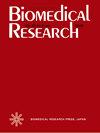Osteogenesis of Human Embryonic Stem Cell
IF 1.3
4区 医学
Q4 MEDICINE, RESEARCH & EXPERIMENTAL
引用次数: 0
Abstract
Numerous cell types including osteoblasts, chondrocytes, fibroblasts and endothelial cells are load delicate and are exposed to day by day mechanical stacking in-vivo. Thick connective tissues like ligament and tendon are extended every now and again through muscle compression brought about by development though bone is under unique stacking to oppose and adjust to the accomplished powers by keeping up homoeostasis through tissue redesigning. The vast majority of the powers applied in-vivo are dynamic and cyclic which implies frequently the tissue is under stacking and resting cycles. For instance femur and tibia go through cyclic pressure and elastic powers during motion. In this manner, it is conceivable that cells react more to cyclic stacking rather than consistent stacking. Consistent stacking may expand the danger of the cells being over-burden and getting inert to the applied burden. A vital zone of exploration in tissue designing is worried about finding the responses to how mechanical stacking moves to the cells, how cells sense mechanical powers and how and when cells react to the applied outer boosts. Both 2D and 3D societies have been utilized to apply mechanical stacking onto cells, albeit 2D examinations, for example, gelatine covered plastic and glass are to some degree restricted since they don't precisely copy the intricate 3D in-vivo engineering. Hence, these surfaces don't satisfy the vital necessities for culture and recovery of utilitarian tissues. Accordingly, 3D in-vitro models may give all the more physiologically pertinent conditions to mechanotransduction contemplates.人胚胎干细胞的成骨作用
包括成骨细胞、软骨细胞、成纤维细胞和内皮细胞在内的许多细胞类型都是负载敏感的,并且每天都暴露在体内的机械堆积中。韧带、肌腱等厚结缔组织通过发育带来的肌肉压迫不时伸展,而骨骼则处于独特的堆叠状态,通过组织的重新设计来保持自身的平衡,以对抗和适应已完成的力量。在体内应用的绝大多数功率是动态的和循环的,这意味着组织经常处于堆叠和休息周期。例如,股骨和胫骨在运动过程中经历循环压力和弹性力。以这种方式,可以想象细胞对循环堆积的反应比一致堆积的反应更多。一致的堆垛会增加电池的过载和对所加负荷的惰性的危险。组织设计中一个重要的探索领域是寻找对机械堆积如何移动到细胞中的反应,细胞如何感知机械力量,以及细胞如何以及何时对施加的外部刺激做出反应。2D和3D社会都被用来对细胞进行机械堆叠,尽管2D检查,例如,明胶覆盖的塑料和玻璃在某种程度上受到限制,因为它们不能精确地复制复杂的3D体内工程。因此,这些表面不能满足培养和恢复实用组织的必要条件。因此,3D体外模型可以为机械转导的设想提供更多的生理相关条件。
本文章由计算机程序翻译,如有差异,请以英文原文为准。
求助全文
约1分钟内获得全文
求助全文
来源期刊

Biomedical Research-tokyo
医学-医学:研究与实验
CiteScore
2.40
自引率
0.00%
发文量
19
审稿时长
>12 weeks
期刊介绍:
Biomedical Research is peer-reviewed International Research Journal . It was first launched in 1990 as a biannual English Journal and later became triannual. From 2008 it is published in Jan-Apr/ May-Aug/ Sep-Dec..
 求助内容:
求助内容: 应助结果提醒方式:
应助结果提醒方式:


